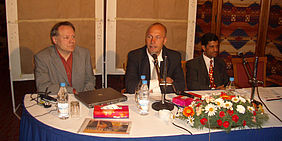By Abdul Aziz Oudah
Feb 19, 2006 - Vol. IX - Issue 06
SANA’A – A training seminar to develop and improve vocational education across Yemen according to international standards was held last week in the Taj Sheba Hotel and in the Ministry of Technical Education and Vocational Training in Sana’a.
The seminar called ‘School Management’ is an initiative of the project ‘Strengthening Priority Areas of Vocational Training’ with the Ministry of Technical Education and Vocational Training, funded by the European Commission and managed by the European consultants German Education and Training GmbH.
The purpose of the seminar is to strengthen the teaching and training process through the presentation of tools and methods in modern school management. It shall give the possibility to introduce School Management in Vocational Training Centers in Yemen and brought together trainers from the institutes of Al-Mukalla, Hadhramaut Governorate, the international institute in Dar-Sa'ad in Aden Governorate, as well as administrators and trainers from the National Hotel and Tourism Institute (NAHOTI) in Sana’a.
Opening the seminar, the Project Coordinator Mr. Gamil Redha said: “This seminar aims to introduce modern ways of School Management to the involved institutes in Yemen and it targets to strengthen the vocational education and training for the ‘Oil & Gas’ and the ‘Hotel & Tourism’ sectors.” He added that the practical part will include examples describing utilities and institutions to allow trainees to learn about administrative and modern science knowledge in School Management.
Kai Partale, a Senior Consultant for the NAHOTI, said: “Managers and trainers have participated in the seminar to benefit and learn how to develop and organize the NAHOTI in both the Hotel School and the Application Hotel. During the last year, we trained a group of trainers with the aim to provide them with the necessary knowledge and skills to enable them to do their works efficiently in managing the institute and carrying out the training programs themselves.”Partale said that the trainees would be able to implement what they have studied: “The one-year training program that started beginning of 2005 will qualify the trainees in many specialist areas. Currently they are preparing their lesson plans in English. In order to reach international standards in the hotel and tourism education, we have officially established a technical committee, in cooperation with the Yemeni private sector to strategically develop this institute and overview the quality of education.”He added: “This seminar will support the institutes with the introduction of modern School Management procedures and it will motivate the staff to design a School Development Plan, and to apply the program in the environment of their institutes.”
In speeches given by Partale and Redha, they said that School Management has to be related to the situation, by taking into consideration the basic elements of School Management, which are leadership, management, cooperation and efficiency & quality.The quality control mechanism of competence, cooperation, communication and responsibility in enterprises can not just easily be transferred to schools. The quality of education and training is certainly the central objective of the School Management, but not the only one. Education and training can not only be managed by the basic requests and regulations of quality management.The teaching and training process also needs a good climate within the institute or school. A good school climate is mainly created through readiness for changes, curiosity and voluntary actions. A school is a house of learning where the teacher shows responsibility and trusts in the responsibility of the learner. School Management means first of all to create the school, together with the students and for the students. The school is to be understood as a cooperative identity of common objectives, written down in an agreed School Development Plan.
The School Development Plan is based on several steps: to develop common ideas, to describe the present situation, to define the future house of learning, and to take actions of achievement. The quality of education and training cannot be derived only from the quality of the diploma, but is rather related to the quality of the structure of the training process and the results achieved.
The quality of education and training is a question of the culture of the school, which is made up of the culture of learning, methodology and organization. All involved in the school have to live in an atmosphere which allows them to learn in a manner that is progressive, sustainable, effective and successful. The main criterion of success is whether the students are well qualified and whether they have learned to act in our society as responsible citizens. The function of the School Development Plan is to identify all people involved and to integrate all people concerned. This must be done through improving transparency and commitments, making sure quality standards are applied, public relations are settled, and that the performance is transparent. Taking the above mentioned into consideration, the participants of the School Management Seminar worked out several issues for their own School Development Plan during the one week of intensive theoretical and practical training.
Copyright (c) 2004 – 2005
Yemen Observer Newspaper
